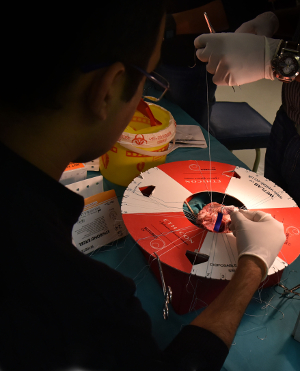Latest News Archive
Please select Category, Year, and then Month to display items
06 April 2018
Photo Rulanzen Martin
 From the left: Dr Thulisile Mphambukeli, leader of the BRICS research team that is exploring the political economy of water and food security, and her research partner, Dr Victor Okorie.
From the left: Dr Thulisile Mphambukeli, leader of the BRICS research team that is exploring the political economy of water and food security, and her research partner, Dr Victor Okorie.
A Brazil, Russia, India, China and South Africa (BRICS) delegation is to hold the 10th Annual BRICS Summit in the last week of May 2018 in Johannesburg. Dr Thulisile Mphambukeli, leader of the University of the Free State (UFS) research team alongside Dr Victor Okorie from the Department of Urban and Regional Planning, in collaboration with Prof Lere Amusan of North-West University, will ensure that water and food security is a prominent feature on the gathering’s agenda.
First, the project titled: “Exploring the political economy of water and food security nexus in BRICS and Africa” will debut at the National Institute for the Humanities and Social Sciences BRICS Think Tank Forum”.
According to Dr Mphambukeli, the key to water security is attitudinal change by means of education and conscientisation. This, she is adamant about, holds the potential to drive behavioural adjustments in the way society interacts with water.
Genetic and social approaches
Dr Okorie asserts that if strides towards reducing the demand for water were to be made, research efforts should be geared towards effecting changes at DNA level. Meaning we need to explore waterwise ways that enable crops and animals to thrive optimally.
The project also looks at social dimensions of water such as flushing a toilet. “Research activities on redesigning toilets, especially the urinal, where more than nine litres of water are used to flush less than one cubic centimetre of urine, are timely in the context of managing water and the food nexus crises,” said Dr Okorie.
Combining the genetic and social approaches would allow us to produce more with a smaller water footprint. This can be made possible by implementing precision agriculture which is about estimating and applying exact quantities of water and nutrients needed for the production of crops or the raising of livestock.
Paradigm shifting policies
Prof Amusan said the team intended to propose functional solutions that take the quality of water into consideration. Equitable production and distribution of water depends on endorsing policies of co-production between citizens, governments and the public sector. BRICS member states mutually consider water and food security as an issue of paramount significance, hence its feature on this prestigious summit’s agenda.
Training symposium draws cardiothoracic surgeons from the continent to the UFS
2015-07-15
 |
The University of the Free State hosted its annual Hannes Meyer Registrar Symposium at the Bloemfontein campus from 10 to 12 July 2015. This symposium was a collaborative effort by the UFS, the Society for Cardiothoracic Surgeons of South Africa (SCTSSA) and the European Association for Cardiothoracic Surgeons (EACTS). Young surgeons in training (registrars) from all over the continent attended this two and a half day conference.
The delegates include the heads of the departments of, or a senior consultant from, every department of Cardiothoracic Surgery in South Africa as well as two or three registrars and three perfusionists. In addition, delegates from other African countries were welcomed to our shores as well.
Unlike traditional conferencing, this symposium will feature a wet lab session, where surgeons perform a range of heart operations in a laboratory setting, using pig hearts.
The symposium is organised by Prof Francis Smit, (Head of the Department of Cardiothoracic Surgery, UFS) and Prof Tony Linegar, (part-time lecturer-UFS).
“This is a truly remarkable training symposium. It is supported internationally by EACTS, nationally by SCTSSA, and locally by the UFS. It is the largest training symposium in Africa, and Bloemfontein/UFS is proud to host this event on an annual basis, having coordinated and organised this event since 2004.”